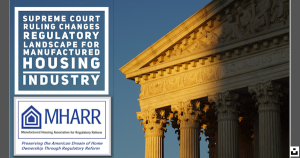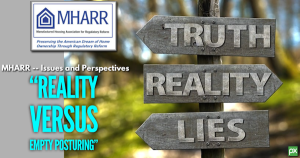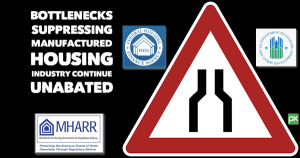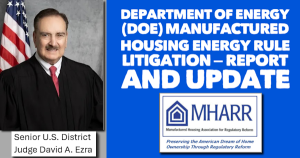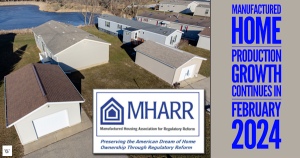MHARR Asserts New Arguments for Withdrawal of Manufactured Housing DOE Energy Rule
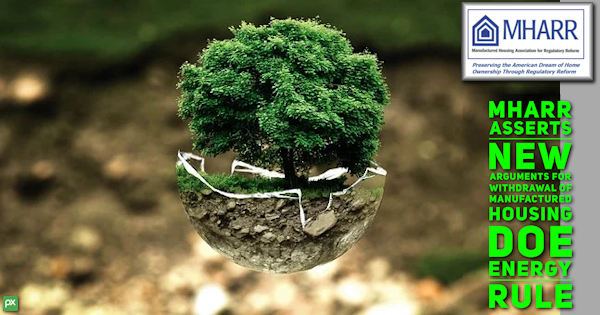
Washington, D.C., March 1, 2022 – In its continuing effort to oppose the unnecessary and costly manufactured housing energy standards rule proposed by the U.S. Department of Energy (DOE), the Manufactured Housing Association for Regulatory Reform (MHARR) has filed comments copy attached opposing the use of a Draft Environmental Impact Statement (Draft EIS) published by DOE on January 14, 2022, in connection with that rulemaking. The Draft EIS, required by the National Environmental Policy Act (NEPA), is one of the few remaining steps in the administrative process for the development of a final DOE energy standards rule, and represents what could be one of the last opportunities for the industry and consumers to submit administrative-level comments opposing the rule.
First, the comments fully set forth MHARR’s position that the entire DOE manufactured housing energy rulemaking, including proceedings related to the Draft EIS are, in fact, stayed and enjoined under a preliminary injunction issued February 11, 2022 by the United States District Court for the Western District of Louisiana in Louisiana v. Biden, Case No. 2:21-CV-01074, barring DOE and other federal defendants from using “Social Cost of Carbon” values in pending and future rulemaking activities. As MHARR initially advised DOE on February 16, 2022, both the Memorandum Ruling issued by the court and subsequent filings by the U.S. Department of Justice (DOJ), make it abundantly clear that not only is DOE generally subject to that injunction, but is also, by DOJ’s admission, specifically enjoined with respect to the DOE manufactured housing energy standards rulemaking. As a result, the DOE manufactured housing energy standards rulemaking, by law, cannot and should not proceed pending final action by either the District Court or a higher-level court.
Second, however, in the event that the court’s current injunction is either stayed or invalidated, and the pending rulemaking proceeds, MHARR’s comments object to the substance of the Draft EIS. Most significantly, MHARR’s findings show that the proposed DOE energy standards are wholly, completely and totally inappropriate for, and inapposite to, today’s modern, affordable post-2000 reform law manufactured homes, which constitute legitimate housing for all purposes, and are instead targeted at the “trailers” of the past, which no longer exist – as is shown by the trendline of manufactured housing energy cost data, which is now below the trendline for site-built homes for all fuel types (i.e., oil, electricity and natural gas).
Furthermore, the Draft EIS, as shown by MHARR’s comments, totally fails to consider the extent and impact of significant individual and societal costs that would flow from the proposed rule including, but not limited to: (1) direct individual and societal-level opportunity and related costs for the millions of Americans who would be excluded from homeownership by the purchase price increases necessitated by the proposed rule; (2) downstream societal costs resulting from the exclusion of millions of Americans from homeownership as a result of purchase price increases necessitated by the proposed rule including, but not limited to: forced utilization of substandard housing; forced utilization of unsafe or unhealthy housing; forced utilization of taxpayer-subsidized housing; physical and/or mental illness resulting from (or exacerbated by) homelessness or housing poverty and related costs; and increases in crime and criminal activity; and (3) failure to consider the diminution of alleged benefits of the proposed rule as a result of the rampant market exclusion of lower-income buyers, among other things. By contrast, if DOE had bothered to fully comply with the express terms of both EISA and the 2000 reform law, it would have gone through the proper procedures to arrive at a legitimate, valid and workable standard for the unique characteristics and affordability of today’s modern manufactured housing, in accordance with section 604 of the Act, rather than nearly two decades of wasted time.
By failing to consider – at all – these and other predictably-significant individual and domestic societal costs of the proposed rule, while simultaneously attempting to pad the rule’s alleged “benefits” with global carbon reduction assumptions, the Draft EIS simultaneously understates the costs of the proposed rule while it simultaneously overstates its alleged benefits contrary to NEPA, the federal Administrative Procedure Act and other applicable law. These fundamental failures, moreover, are in addition to and further exacerbate fatal defects throughout the DOE rulemaking progress, as addressed by MHARR in its previous comments in this matter. As a result, MHARR’s Draft EIS comments call on DOE to withdraw the proposed rule and to instead partner with HUD in a legitimate rulemaking, targeted at the valid energy needs of actual manufactured housing consumers, instead of extremist environmental “activist” groups.
The Manufactured Housing Association for Regulatory Reform is a Washington, D.C.-based national trade association representing the views and interests of independent producers of federally-regulated manufactured housing.
Attachment

Washington, D.C., March 1, 2022 – In its continuing effort to oppose the unnecessary and costly manufactured housing energy standards rule proposed by the U.S. Department of Energy (DOE), the Manufactured Housing Association for Regulatory Reform (MHARR) has filed comments copy attached opposing the use of a Draft Environmental Impact Statement (Draft EIS) published by DOE on January 14, 2022, in connection with that rulemaking. The Draft EIS, required by the National Environmental Policy Act (NEPA), is one of the few remaining steps in the administrative process for the development of a final DOE energy standards rule, and represents what could be one of the last opportunities for the industry and consumers to submit administrative-level comments opposing the rule.
First, the comments fully set forth MHARR’s position that the entire DOE manufactured housing energy rulemaking, including proceedings related to the Draft EIS are, in fact, stayed and enjoined under a preliminary injunction issued February 11, 2022 by the United States District Court for the Western District of Louisiana in Louisiana v. Biden, Case No. 2:21-CV-01074, barring DOE and other federal defendants from using “Social Cost of Carbon” values in pending and future rulemaking activities. As MHARR initially advised DOE on February 16, 2022, both the Memorandum Ruling issued by the court and subsequent filings by the U.S. Department of Justice (DOJ), make it abundantly clear that not only is DOE generally subject to that injunction, but is also, by DOJ’s admission, specifically enjoined with respect to the DOE manufactured housing energy standards rulemaking. As a result, the DOE manufactured housing energy standards rulemaking, by law, cannot and should not proceed pending final action by either the District Court or a higher-level court.
Second, however, in the event that the court’s current injunction is either stayed or invalidated, and the pending rulemaking proceeds, MHARR’s comments object to the substance of the Draft EIS. Most significantly, MHARR’s findings show that the proposed DOE energy standards are wholly, completely and totally inappropriate for, and inapposite to, today’s modern, affordable post-2000 reform law manufactured homes, which constitute legitimate housing for all purposes, and are instead targeted at the “trailers” of the past, which no longer exist – as is shown by the trendline of manufactured housing energy cost data, which is now below the trendline for site-built homes for all fuel types (i.e., oil, electricity and natural gas).
Furthermore, the Draft EIS, as shown by MHARR’s comments, totally fails to consider the extent and impact of significant individual and societal costs that would flow from the proposed rule including, but not limited to: (1) direct individual and societal-level opportunity and related costs for the millions of Americans who would be excluded from homeownership by the purchase price increases necessitated by the proposed rule; (2) downstream societal costs resulting from the exclusion of millions of Americans from homeownership as a result of purchase price increases necessitated by the proposed rule including, but not limited to: forced utilization of substandard housing; forced utilization of unsafe or unhealthy housing; forced utilization of taxpayer-subsidized housing; physical and/or mental illness resulting from (or exacerbated by) homelessness or housing poverty and related costs; and increases in crime and criminal activity; and (3) failure to consider the diminution of alleged benefits of the proposed rule as a result of the rampant market exclusion of lower-income buyers, among other things. By contrast, if DOE had bothered to fully comply with the express terms of both EISA and the 2000 reform law, it would have gone through the proper procedures to arrive at a legitimate, valid and workable standard for the unique characteristics and affordability of today’s modern manufactured housing, in accordance with section 604 of the Act, rather than nearly two decades of wasted time.
By failing to consider – at all – these and other predictably-significant individual and domestic societal costs of the proposed rule, while simultaneously attempting to pad the rule’s alleged “benefits” with global carbon reduction assumptions, the Draft EIS simultaneously understates the costs of the proposed rule while it simultaneously overstates its alleged benefits contrary to NEPA, the federal Administrative Procedure Act and other applicable law. These fundamental failures, moreover, are in addition to and further exacerbate fatal defects throughout the DOE rulemaking progress, as addressed by MHARR in its previous comments in this matter. As a result, MHARR’s Draft EIS comments call on DOE to withdraw the proposed rule and to instead partner with HUD in a legitimate rulemaking, targeted at the valid energy needs of actual manufactured housing consumers, instead of extremist environmental “activist” groups.
The Manufactured Housing Association for Regulatory Reform is a Washington, D.C.-based national trade association representing the views and interests of independent producers of federally-regulated manufactured housing.
Attachment




